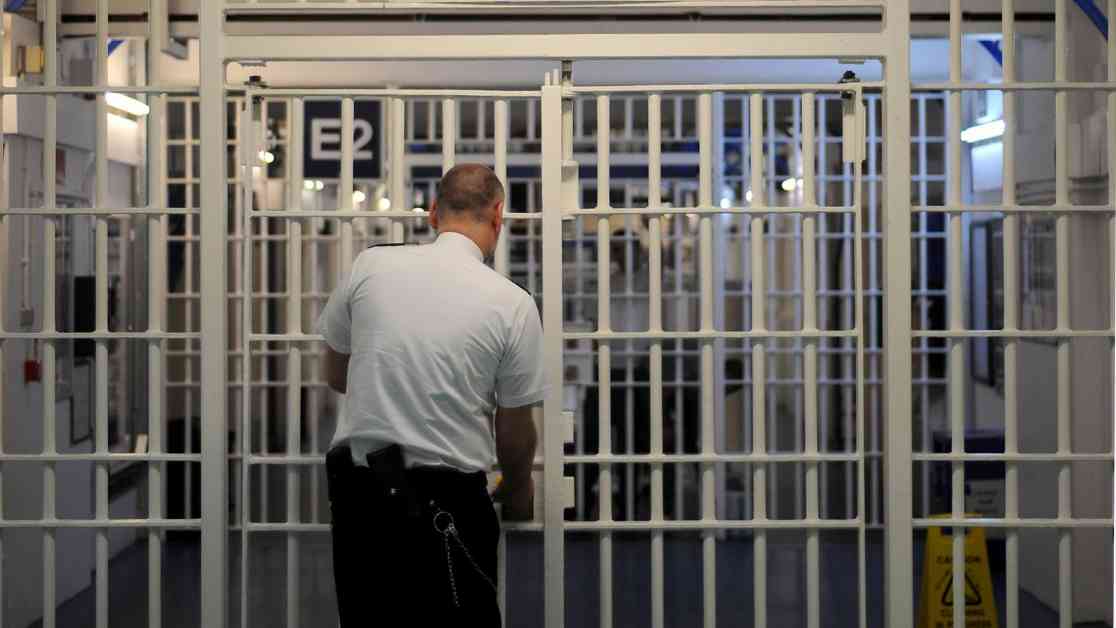Chief Prisons Inspector Issues Warning About ‘Revolving Door’ with 1,750 Inmates Set for Early Release
The chief inspector of prisons for England and Wales, Charlie Taylor, has raised concerns about the immediate release of approximately 1,750 offenders, stating that the move poses significant risks. This decision was made in an effort to alleviate the overcrowding crisis in the country’s prisons, with the government asserting that the alternative would have resulted in a complete breakdown of the criminal justice system.
In an interview with Sky News, Taylor expressed his apprehensions about the simultaneous release of such a large number of prisoners, highlighting the potential challenges this poses for local communities and the strained probation services. He noted that while typically around 1,000 prisoners are released weekly, the additional 1,750 inmates being released today, along with another 2,000 in October, will further strain an already overburdened system.
Justice Secretary Shabana Mahmood defended the decision, emphasizing that the government inherited a prison system on the verge of collapse. Mahmood stated that the early release measure was a last resort, as the alternative would have resulted in a complete breakdown of the criminal justice system, jeopardizing law and order by impeding court trials and police arrests.
The early release program excludes offenders convicted of sexual offenses, serious violence, terrorism, and some cases related to domestic abuse. The government announced the decision well in advance to allow probation services sufficient time to prepare for the influx of released inmates. However, the mass release coincides with a scathing report from the chief inspector, depicting a grim reality of life within the prisons, characterized by a surge in illicit drug use, self-harm, and violence.
Subheadings:
1. Challenges of Overcrowded Prisons
2. Impact of Planned Releases and Underfunding
3. Tragic Consequences of Drug Addiction and Self-Harm
The recent inspection of 32 prisons revealed that 30 of them were rated as “poor or insufficiently good,” with 60% suffering from overcrowding. The report highlighted the inadequacies in planned releases, citing an example where 30% of individuals leaving Bedford Prison had no housing arrangements upon release.
Former inmate Zack Griffiths, who served time in HMP Parc for drug offenses, shed light on the prevalence of drugs within the prison, attributing their entry to corrupt officers and drones dropping substances near cell windows. Griffiths emphasized the dangers of unregulated drug use within the prison system, emphasizing the risks it poses to both inmates and the public upon their release.
The devastating impact of synthetic drugs like spice and nitazines was tragically illustrated by the case of Ryan Harding, a 26-year-old inmate at Parc prison who died of an apparent overdose. Harding’s mother, Catherine Harding, accused the prison of negligence, claiming that her son’s vulnerability was exacerbated by inadequate medication for epilepsy and alleged drug smuggling by prison staff.
The private management of HMP Parc by G4S has come under scrutiny, with a spokesperson acknowledging the challenges posed by a small minority of staff engaging in criminal behavior. A recent case of corruption involving a prison officer attempting to smuggle drugs further underscores the need for stricter oversight and enforcement measures.
Subheadings:
4. Rehabilitation Challenges in Prisons
5. Vulnerability to Recidivism and Recalls
6. Calls for Reform and Accountability
The failure of the previous government’s early release scheme to address the root causes of overcrowding and underfunding in prisons has led to a revolving door effect, where untreated mental health issues and substance abuse contribute to a cycle of reoffending. Campaigners have emphasized the fatal consequences of overcrowded jails, citing instances of drug addiction and self-harm among inmates.
Prison conditions, including extended periods of confinement in cells and limited access to rehabilitation programs, have been identified as key factors contributing to inmate vulnerability and instability. The lack of adequate support for individuals transitioning back into society upon release further exacerbates the risks of recidivism and breaches of bail conditions.
Calls for reform within the prison system have been growing louder, with advocates urging for increased accountability and transparency in the management of correctional facilities. The need for comprehensive rehabilitation programs and mental health support for inmates has been underscored by the tragic outcomes of drug-related deaths and self-harm incidents.
In conclusion, the early release of 1,750 offenders highlights the urgent need for systemic reforms to address the underlying issues of overcrowding, underfunding, and inadequate rehabilitation in the prison system. The risks posed by the revolving door effect and the cycle of recidivism underscore the need for a more holistic approach to criminal justice that prioritizes rehabilitation, support, and accountability. As the nation grapples with the challenges of an overburdened prison system, it is imperative to prioritize the well-being of inmates and the safety of communities through targeted interventions and sustainable solutions.












